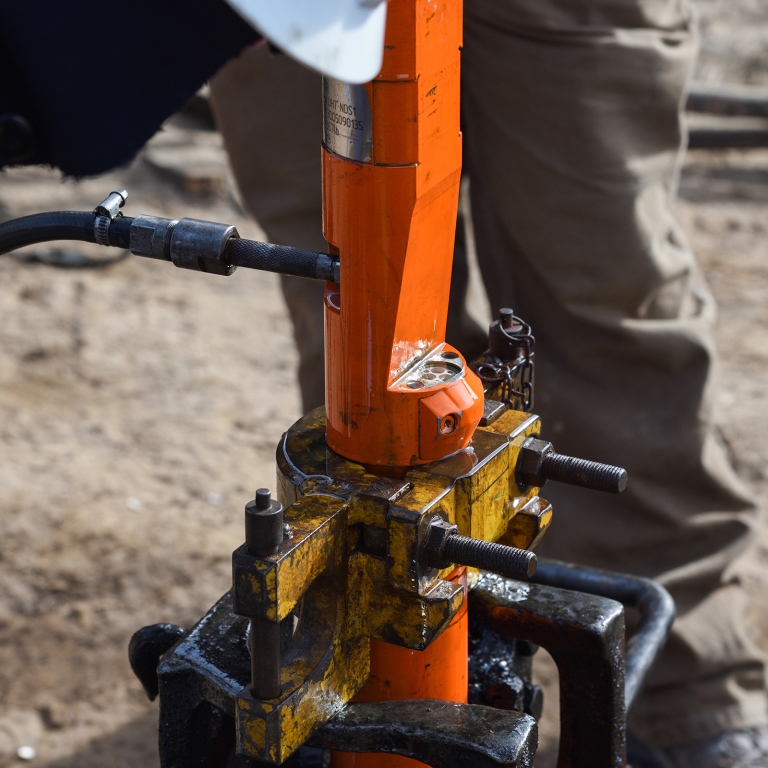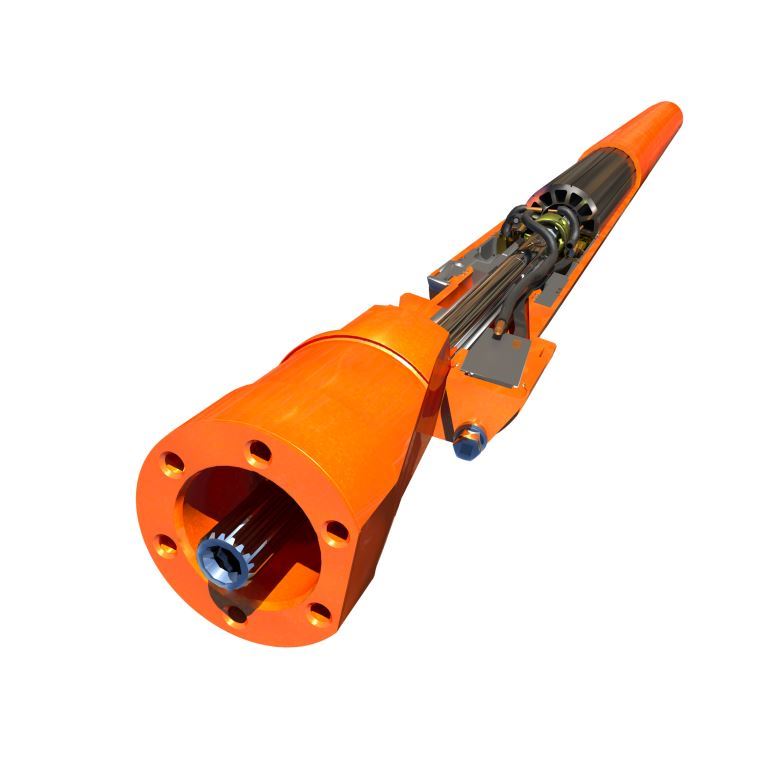PERMANENT MAGNET MOTORS
Novomet permanent magnet motors
The Novomet permanent magnet motor (PMM) is the preferred motor in the artificial lift industry for electrical submersible pumping (ESP) systems. These powerful motors are the most reliable, robust, and energy efficient motors available with the widest range of available sizes and horsepower options.
Novomet PMMs are viewed as the industry leader and the benchmark to which all other PMMs are compared. We have deployed more than 11,000 permanent magnet motors around the world and have installed more than 50% of the PMMs running in the Americas as of the day this page was published.
In unconventional wells, our permanent magnet motors deliver superior runlife with exceptional reliability by running cooler than induction motors. In conventional plays, they not only run longer than induction motors, but they also reduce electricity consumption with superior efficiency, helping customers reduce carbon emissions. And in smaller casing sizes, our 217, 319, and 406 series ESP PMMs can be run deeper in hole and leave more room for fluid production so operators can keep producing from slimhole wells where other ESP systems can’t fit.
Novomet ESP permanent magnet motors are powerful, efficient, and relentless.
BENEFITS

Our proven, rugged PMMs run cooler, longer, and through more gas slugs than induction motors

PMM efficiency reduces ESP electrical consumption by up to 20% alone and by 30% or more when run with our energy-efficient pumps

Glide through 4½-in. and 5-in. casing to produce oil where other ESPs can’t fit
applications
- Unconventional—More reliable with fewer failures than induction motors (runs cooler, longer, and through gas slugs)
- Conventional—More reliable with fewer failures than induction motors, reduced electrical consumption, and lower carbon emissions
- Slimhole—Enables production of oil our competitors leave behind
- Downhole-driven ESPCP, rotary pump, and geothermal pumping systems
- Widest range of flows and pressures in the industry
capabilities
-
Delivers longer runlife by reducing overall system heat
-
Outperforms induction motors in tough conditions including viscous oil, cycling ESPs, marginal wells, fractured wells, and high fluid temperatures
-
Reduces ESP energy consumption
features
-
We offer the smallest PMM available on the market, making it particularly advantageous in SlimLine ESP and Colibri Rigless ESP systems
-
Permanent magnetic field reduces the heat generated per unit of power

Electricity loss in asynchronous induction motors
Standard induction motors (also called asynchronous ESP motors) convert three-phase current to an electromagnetic field that spins to create rotation. This rotary energy drives the rotor in an ESP to lift fluid from the reservoir to the surface. All induction motors consume electricity to create the electromagnetic field that makes rotation possible. Instead of converting all the electricity they receive to torque, somewhere between 13 and 20% of that energy is used to establish and maintain an electromagnetic field. So instead of producing oil with that energy, it is literally being converted into heat energy, wasting power and reducing motor runlife.
The PMM breakthrough
Unlike standard induction motors, the PMM uses rare earth magnets and special circuitry to create a constant rotor magnetic field, delivering greater torque and rotation with less electricity. This design increases motor efficiency, decreases power consumption, and reduces motor heat. The benefits are superior motor runlife, the ability to coast through gas slugs without locking, and electrical consumption reduction by up to 20%.
PMM rotors virtually eliminate electrical losses in the rotor, so they produce more available horsepower than conventional rotors. Because of this increase in horsepower density, Novomet ESP PMM motors are 30% shorter and lighter than equivalent horsepower induction motors.
Compared to asynchronous induction motors, ESP PMMs reduce electrical consumption around 10% at the best efficiency point and consistently deliver energy savings up to 20% when underloaded.
The motor includes a stator with a three-phase winding, a rotor with a strong permanent magnet, a head, and a base. The stator magnetic circuit consists of sheets of electrical steel with a heat-resistant coating that are pressed into a tubular body. The stator winding is a single-layer, lingering reel made of heat-resistant winding wire that is wound in a star pattern to provide a common control point for system settings. The rotor with permanent magnets is installed in the stator bore on sliding bearings.
PMM speed is regulated and adjusted from the surface with a variable speed drive (VSD) that uses a vector control algorithm and proprietary Novomet software. The VSD enables frequency changes so motor speed and net power to the shaft can be adjusted as needed to improve efficiency.
Largest PMM Portfolio in the ESP Industry
Novomet is proud to offer the largest selection of PMM size and horsepower offerings available in the industry. Below is a PMM summary chart. Refer to the TECHNICAL CHARACTERISTICS section for more detail.
|
Series |
217 |
319 |
406 |
460 |
512 |
744 |
|
Available speeds (rpm) |
8500 |
1000–6000 |
1000–4200 1000–6000 |
100–1500 1000–4200 1000–6000 |
1000–4200 1000–6000 |
1000–4200 |
|
Tandem speeds (rpm) |
8500 |
1000–6000 |
— |
— |
4500 |
— |
|
Power factor |
0.92 |
0.95 |
0.95 |
0.95 |
0.95 |
0.91 |
|
Motor efficiency |
86 |
90 |
93 |
93 |
93 |
95 |
|
Rated winding temperature |
392°F 200°C |
482°F 250°C |
482°F 250°C |
482°F 250°C |
482°F 250°C |
482°F 250°C |
|
Max HP |
47 94 tandem |
120 270 tandem |
375 |
536 |
863 1030 tandem |
TECHNICAL CHARACTERISTICS

Low speed (100–1500 rpm) PMM for PCPs and Novomet rotary displacement cylindrical pumps
|
Motor OD |
Speed range |
Power rating in one section |
|
117 mm |
100-1500 rpm |
up to 40 KW (@58Hz) 500 rpm |
|
4.60 in |
up to 54 hp (@58Hz) |
PMM rated at 3000 rpm for ESP systems (Conventional, Impala, SlimLine, PowerSave)
|
Motor OD |
Speed range |
Power rating in one section |
|
103 mm |
1000-4200 rpm |
6-200 KW (@100Hz) |
|
4.06 in |
10- 320 hp (@120Hz) |
|
|
117 mm |
1000-4200 rpm |
12-310 KW (@100Hz) |
|
4.60 in |
19-500 hp (@120Hz) |
|
|
130 mm |
1000-4200 rpm |
32-300 KW (@100Hz) |
|
5.12 in |
50-480 hp (@120Hz) |
|
|
185 mm |
1000-4200 rpm |
60-800 KW (@100Hz) |
|
7.44 in |
96-1285 hp (@120Hz) |
PMM rated at 6000 rpm for ESP systems (Conventional, Impala, SlimLine, PowerSave)
|
Motor OD |
Speed range |
Power rating in one section |
|
55 mm |
8500 rpm |
Up to 35 KW (@283Hz) |
|
2.17 in |
Up to 47 hp (@283Hz) |
|
|
81 mm |
1000-6000 rpm |
4-90 KW (@200Hz) |
|
3.19 in |
5-120 hp (@200Hz) |
|
|
103 mm |
1000-6000 rpm |
12-280 KW (@200Hz) |
|
4.06 in |
16-375 hp (@200Hz) |
|
|
117 mm |
1000-6000 rpm |
12-280 KW (@200Hz) |
|
4.60 in |
14-375 hp (@200Hz) |
|
|
130 mm |
1000-6000 rpm |
60-644 KW (@200Hz) |
|
5.12 in |
80-863 hp (@200Hz) |
Tandem PMM rated at 6000 rpm for ESP systems (Conventional, Impala, SlimLine, PowerSave)
|
Motor OD |
Speed range |
Power rating in one section |
|
55 mm |
8500 rpm |
Up to 70 KW (@283Hz) |
|
2.17 in |
Up to 94 hp (@283Hz) |
|
|
81 mm |
1000-6000 rpm |
100-200 KW (@200Hz) |
|
3.19 in |
135-270 hp (@200Hz) |
|
|
130 mm |
4500 rpm |
up to 770 KW (@150Hz) |
|
5.12 in |
up to 1030 hp (@150Hz) |
High-speed and low-speed flexibility
Our variable speed drives use a unique voltage scheme to produce a wide range of rotation speeds while keeping electricity consumption steady. The result is a motor that is incredibly efficient when operating at typical speeds (500 to 6,000 rpm), and that can be easily adapted to low speeds (100 to 500 rpm) for use with low-flow wells and high-viscosity fluids. We have also adapted the PMM to function with progressive cavity pumps (PCPs) to create a highly reliable downhole-driven ESPCP.
PMM advantages
Compared to standard asynchronous induction motors, the PMM:
-
Reduces power consumption by up to 20% alone, and by up to 30% or more when paired with energy-efficient pumps
-
Improves ESP performance across a wide range of flow rates and loads
-
Enables stable ESP operation by maintaining consistent torque at the shaft regardless of rotation speed
-
Delivers longer runlife by reducing overall system heat and coasting through gas slugs
-
Reduces motor length and body weight while maintaining power
-
Delivers 380 HP with a single PMM, eliminating the need for tandem motors in many wells
Permanent magnet motor safety
We are proud of our safety record and performance at Novomet. We have industry-leading safety procedures and protocols specific to running, operating, and pulling PMMs. Along with these procedures, our field personnel use a shorting device when handling ESP systems with a PMM, greatly reducing the risk of electrical discharge in backflow conditions. We are also proud to be contributors to the API guidelines specific to permanent magnet motors currently under development.
Sizes and applications
The permanent magnet motor is designed for use with our conventional pumps, Impala extended-range ESP systems, PowerSave ESP systems, and SlimLine ESP systems. Impala, PowerSave, and SlimLine pumps reduce ESP system length and weight, and feature a smaller outside diameter (OD) than many competing systems. This makes them ideal for horizontal wells and wells with high dogleg severity. Common applications include:
-
Unconventional—More reliable with fewer failures than induction motors (runs cooler, longer, and through gas slugs)
-
Conventional—More reliable with fewer failures than induction motors, reduced electrical consumption, and lower carbon emissions
-
Slimhole—Enables production of oil our competitors leave behind
-
Downhole-driven ESPCP, rotary pump, and geothermal pumping systems
-
Widest range of flows and pressures in the industry
The PMM is available in multiple sizes, from as small as a 2.17-in. (55-mm) outside diameter (OD) to a 7.44-in. (188-mm) OD. We offer the smallest PMM available on the market, making it particularly advantageous in slimline ESP applications and for use with our cable-deployed rigless ESP .


